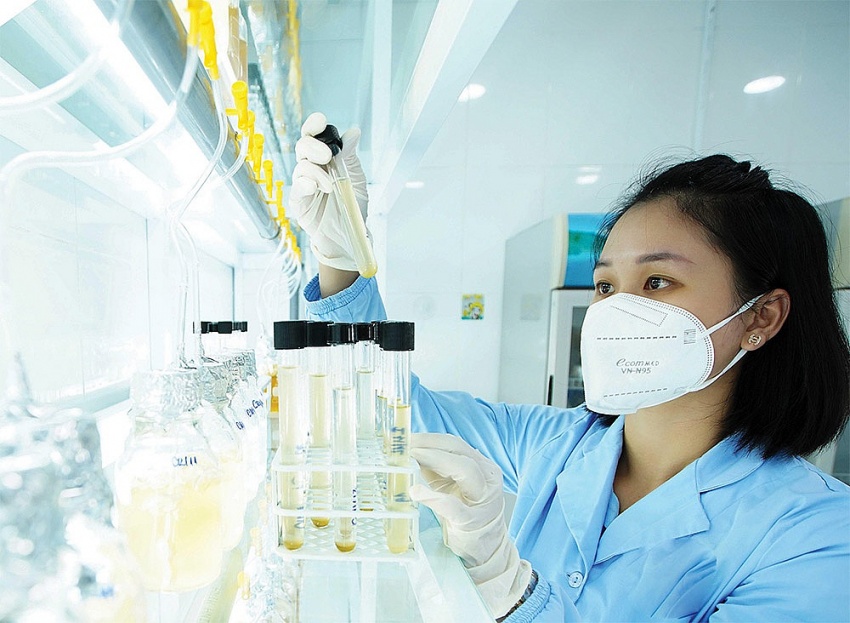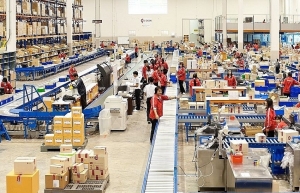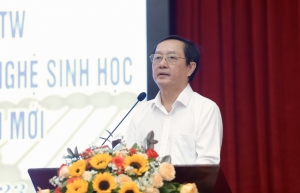Investment builds on biotech potential
South Korean companies have recently announced big investments in Vietnam’s biotech sector. In May, SK Group began construction of its Ecovance high-tech biodegradable materials factory project in Dinh Vu Industrial Park in the northern city of Haiphong. The project has an initial investment of $100 million. By 2030, the investment capital is planned to reach $500 million.
 |
| Prospects are strong for local and foreign businesses as a result of a push to attract biotech funding, Photo: Le Toan |
The project’s goal is to produce biodegradable plastic materials, products, and related materials for the production of biological materials. The project is designed with an annual capacity of 70,000 tonnes of PBAT biodegradable plastic products, 59,500 tonnes of PBS biodegradable plastic products, and 6,300 tonnes of THF solvent products.
Another South Korean company, Hyosung TNC, also received investment approval for the Hyosung BDO project from Ba Ria-Vung Tau People’s Committee in March as part of its efforts to build the largest bio-spandex factory in Vietnam. Specifically, Hyosung TNC plans to invest $1 billion to establish multiple bio-BDO production plants capable of making 200,000 tonnes annually.
Pritesh Samuel, head of Business Intelligence at consultancy firm Dezan Shira & Associates, said South Korea and Vietnam have had a very close relationship in recent decades.
“It’s no surprise that South Korean companies are investing in biotech projects as they diversify their investment industries. Vietnam’s government has strived to make it easier for investors to do business in Vietnam and, in terms of biotech projects, Vietnam’s labour costs are lower, making it attractive for manufacturing and clinical trials,” he said.
Elsewhere, US biotech firm Kraig Biocraft Laboratories has also secured a stronger presence in the Vietnamese market. The company has opened its new recombinant spider silk production centre in the Central Highlands province of Lam Dong in February. The new facility is located in the heart of Vietnam’s booming silk economy, providing excellent access to fresh mulberry and cocoon reeling facilities. It will serve as the centre of operations for the company’s growing spider silk production.
Besides foreign companies, local biotech enterprises and startups are ramping up research and development (R&D) capabilities for biotech across various fields from healthcare to agriculture and environmental management in Vietnam.
Vietnamese biotech firm Gene Solutions has raised $40 million in three previous rounds to expand its presence in Vietnam.
Nguyen Hoang Chuong, fundraising and investor relations managers at Gene Solutions told VIR, “The funding will be used mostly for R&D to strengthen existing core products such as non-invasive tests and oncology tests, and develop next-generation genetic solutions. The remaining funding will be for building brand awareness, clinical validation, and lab network expansion.”
In addition, the healthcare sector in Vietnam is witnessing rapid growth, with biotech playing a key role. The market for cancer liquid biopsy and gene therapy is expected to grow at least a compound annual growth rate (CAGR) of 20 per cent over the next decade, he added.
Meanwhile, LiveSpo Pharma is leading in breakthrough biotechnology, and medical probiotics with no adverse effects. Dang Quoc Hung, CEO of LiveSpo Pharma, told VIR, “Vietnam’s biotech market has seen a steady increase in investment, with the market size expected to reach $10 billion by 2030, growing at a CAGR of 15 per cent from 2021. We have successfully navigated this landscape by securing $8.8 million funding from Mekong Enterprise Fund IV in 2021, supporting our innovative research and product development in spore-based probiotics technology.”
The firm’s strategy focuses on developing innovative medical probiotics which reduce the use of antibiotics and shorten treatment times, improving patient recovery and lowering healthcare costs. “Our presence at international conferences such as Vitafoods Europe 2024 and the BIO International Convention 2023 has enhanced our global visibility. These platforms allow us to showcase our high-concentration, multi-strain liquid medical probiotics, attract significant attention, and potential funding for further research, solidifying our position as a pioneer in the healthcare biotech sector,” Hung added.
Vietnam has set a goal of becoming one of the top 10 leading countries in Asia in advanced biotechnology by 2030. Looking ahead to 2045, Vietnam envisions itself as a top hub for smart products and services, powered by a thriving biotech industry.
According to Samuel from Dezan Shira & Associates, this shows the investment climate is ripe for both domestic and foreign businesses as a result of the government’s push to attract investment in biotech. Both domestic and foreign companies can propel the biotech industry in Vietnam, provided the right conditions.
“Foreign companies can bring advanced tech, research methodologies, and market access, allowing local companies to implement these ventures. While local companies have deep knowledge of the market regulations, foreign companies can tap into this to create products tailored to Vietnam’s specific needs, but also to export markets,” Samuel said.
 | DKSH enters new partnership with Wuxi NEST Biotechnology DKSH Business Unit Technology has begun a new partnership with Wuxi NEST Biotechnology, a manufacturer of plastic laboratory products in Australia, Indonesia, New Zealand, the Philippines, Singapore, Thailand, and Vietnam. |
 | Vietnam moves to develop biotechnology Vietnam aims to develop and apply biotechnology as part of the country's sustainable development, striving to build an international-standard industry. |
 | AstraZeneca buys French biotech firm Amolyt for $1 bn Anglo-Swedish pharmaceuticals giant AstraZeneca on Thursday agreed to buy French biotech specialist Amolyt Pharma for about $1 billion, expanding further into the field of rare drugs. |
What the stars mean:
★ Poor ★ ★ Promising ★★★ Good ★★★★ Very good ★★★★★ Exceptional
 Tag:
Tag:
Related Contents
Latest News
More News
- Kurz Vietnam expands Gia Lai factory (February 27, 2026 | 16:37)
- SK Innovation-led consortium wins $2.3 billion LNG project in Nghe An (February 25, 2026 | 07:56)
- THACO opens $70 million manufacturing complex in Danang (February 25, 2026 | 07:54)
- Phu Quoc International Airport expansion approved to meet rising demand (February 24, 2026 | 10:00)
- Bac Giang International Logistics Centre faces land clearance barrier (February 24, 2026 | 08:00)
- Bright prospects abound in European investment (February 19, 2026 | 20:27)
- Internal strengths attest to commitment to progress (February 19, 2026 | 20:13)
- Vietnam, New Zealand seek level-up in ties (February 19, 2026 | 18:06)
- Untapped potential in relations with Indonesia (February 19, 2026 | 17:56)
- German strengths match Vietnamese aspirations (February 19, 2026 | 17:40)






















 Mobile Version
Mobile Version